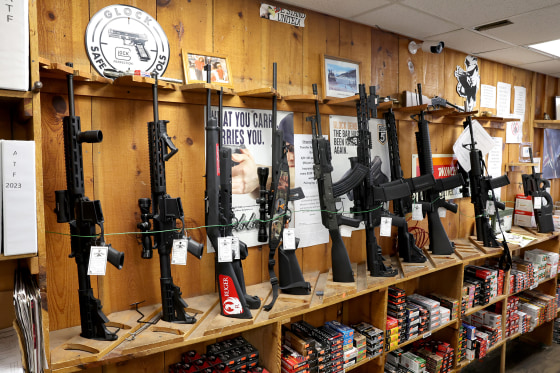
Gun rights advocates say the law barring AR-15s and similar weapons violates their right to bear arms under the Constitution’s Second Amendment.

The Supreme Court avoided taking up an Illinois ban on assault-style rifles, such as these on display in the Chicago suburb of Tinley Park. Scott Olson / Getty Images
July 2, 2024, 1:50 PM UTC / Updated July 2, 2024, 2:37 PM UTCWASHINGTON — The Supreme Court on Tuesday avoided taking up a series of new cases about the scope of the right to bear arms and left in place an Illinois law that bans assault-style weapons such as the AR-15 semiautomatic rifle, which has been used in various high-profile mass shootings.
The decision not to hear the multiple cases challenging the Illinois law means it remains in effect. Litigation over the Illinois ban and similar laws enacted by other states continues, and the issue is likely to return to the justices.
Meanwhile, the court sent several other gun cases back to lower courts for further review in light of its recent ruling that upheld a federal law that prevents people accused of domestic abuse from possessing firearms. In doing so, the court sidestepped adding a new gun case to its docket for the following term, which begins in October.
The court has strongly backed the right to bear arms under the Constitution's Second Amendment, including in a major ruling in 2022, but the recent ruling indicated that some long-standing laws can still survive. The 2022 decision led to a wave of new challenges to existing gun restrictions.
Among the cases the court sent back to lower courts was a challenge to a law that bars users of illegal drugs from possessing firearms, which is the same law that Hunter Biden was recently convicted under.
The court's refusal for now to decide that issue leaves the legal question unresolved as Biden appeals his conviction. The justices could yet decide the issue in a future case.
Another case concerns whether nonviolent felons can be prevented from having guns.
The court also sent back a challenge to new gun restrictions enacted in New York.
In the Illinois case, conservative Justice Samuel Alito indicated he would have taken the case up.
Conservative Justice Clarence Thomas wrote a separate opinion saying he hopes the court in due course takes up the question of what types of weapons can be restricted.
The appeals court ruling upholding the Illinois ban "illustrates why this court must provide more guidance on which weapons the Second Amendment covers," Thomas said.
The announcement, coming soon after the court declined to hear a similar case from Maryland, suggests the court is not eager to weigh in on what has become a recurring issue: whether such bans violate the Second Amendment, which the court expanded in a 2022 gun rights ruling.
In the aftermath of that decision, some states have sought to enact new restrictions, while judges applying the justices’ new test have struck down old ones.
The Illinois statute was enacted following a shooting in the city of Highland Park on July 4, 2022, which killed seven people. In May of last year, the Supreme Court declined to block the new restrictions. It also declined to block similar restrictions enacted in New York, suggesting no great eagerness among the justices to jump in on the issue.
The Illinois law bans what the state defines as assault weapons, including the AR-15 rifle, as well as large-capacity magazines that hold more than 10 rounds of ammunition for long guns or more than 15 rounds of ammunition for handguns.
The law does not ban any handguns. It also does not affect people who already owned the firearms covered by the ban.
Various gun rights activists and groups sued to block the law, saying it violates their right to bear arms under the Second Amendment.
In 1994 Congress enacted a nationwide ban on assault weapons, which expired a decade later. Attempts to revive it have failed.
The legal environment has changed radically in recent years because of the Supreme Court’s pro-gun-rights stance, as shown in a series of rulings beginning with the 2008 decision that recognized an individual right to bear arms for the first time.
Lawrence Hurley is a senior Supreme Court reporter for NBC News.